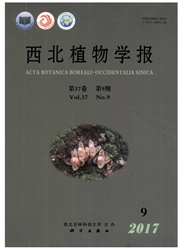

 中文摘要:
中文摘要:
在人工增强紫外线辐射条件下(UV辐射光波长308nm,辐射剂量18kJ·m-2·d^-1),将浓度为1mg·L^-1的芦荟蒽醌类物质喷施到菠菜叶表面(喷施量50mL·m^-2),研究外源芦荟蒽醌类物质在增强UV辐射条件下对菠菜生长发育的影响.结果显示:在增强UV辐射条件下,与没有喷施蒽醌类物质的菠菜相比,喷施蒽醌类物质的菠菜株高增加5.40cm,叶面积增加18.66%,干鲜比增加22.28%,总叶绿素含量高出11.33%,POD和SOD活性分别增加了54.08%和21.05%,类黄酮含量则降低了28%.上述生理生化指标和不受紫外线辐射条件下生长的菠菜发育水平接近.实验结果表明,在植物体表面喷施外源芦荟蒽醌类物质能够有效减轻UV辐射对植物的伤害.
 英文摘要:
英文摘要:
In order to investigate the effect of Aloe's anthraquinone components on the growth and development of spinaches in the field under ultraviolet radiation stress, 1 mg ·L^-1 density anthraquinones components of Aloe were sprayed (the spray content was 50 mL· m^-2 )on the leaf surfaces of spinaches under the artifical enhancement of the ultraviolet radiation (the wavelength is 308 nm, the radiation dose is 18 kJ · m^-2 ·d^-1 ). The results showed:the stem height increased 5.40 cm, the leaf area increased by 18.66 %, the ratio of dry weight to fresh weight increased by 22.28% ,the total chlorophyll content enhanced 11.33%, the POD and SOD activities increased by 54.08% and 21.05% respectively,while the contents of flavonoid decreased by 28%. The physiological and biochemical indices were close to the normal developmental level of the spinaches without UV radiation. The results proved the harm of ultraviolet radiation to plants could be alleviated effectively by spraying exogenous Aloe's anthraquinone components on plant's surfaces.
 同期刊论文项目
同期刊论文项目
 同项目期刊论文
同项目期刊论文
 期刊信息
期刊信息
